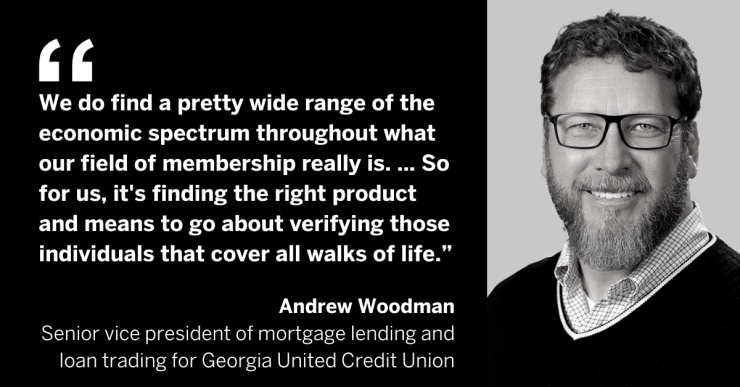
Andrew Woodman is enlisting more advanced technology to protect Georgia United Credit Union from the growing threat of consumer loan fraud, which he says has changed the nature of lending.
"I've been doing this long enough to remember when we used to actually have our team members pick up the phone and do [income] verifications ourselves verbally, and as soon as those procedures and technology transitioned, the expenses to use the services that are out there began to significantly rise as well," said Woodman, who has spent seven years at the $2 billion-asset credit union and became senior vice president of mortgage lending and loan trading in March.
Georgia United, based in Duluth, formed a partnership early in the year with the fintech Argyle, which offers a platform to verify the incomes of loan applicants. Credit union leaders hope the service will ease the strain on underwriting staff and streamline document-gathering — all while ensuring borrowers are who they say they are and make as much money as they claim.
Members applying for funding are prompted to sign into their payroll provider's portal, which grants the lender real-time access to pay stubs, W-2s and other wage documentation through Argyle's integrations.
Georgia United is one of many financial institutions that have hired
Instances of falsified income documentation and other forms during the application process have only increased in recent years, as
The task is tough, even with high-tech help. A
"The fluctuating demand of our market has really challenged lenders to seek out automation solutions that will help them better adapt to industry volatility," said Becca Seward, director of product for the New York-based document automation platform Ocrolus.
Woodman explained how Georgia United has grown into a full-service mortgage lender in the state by working with purchasers such as Fannie Mae and Freddie Mac while offering members loan products through the U.S. departments of Veterans Affairs and Agriculture as well as other sources.
With the credit union's recent opening of a loan-production office in northwest Georgia, leaders hope to "be more proactive and identify areas where the credit union is able to grow and expand" further, Woodman said.

"We do find a pretty wide range of the economic spectrum throughout what our field of membership really is. ... So for us, it's finding the right product and means to go about verifying those individuals that cover all walks of life," Woodman said.
For products like Argyle's, industry experts say periodic reviews of internal procedures and workloads are necessary for minimizing errors during originations.
Nick Volpe, executive vice president of key accounts for Aces, said that institutions wary of these vulnerabilities need to improve communication between loan officers and back-office staff to identify common problems.
"It's not like staff are intentionally saying that they don't care about risk, because we don't find that to be honest," Volpe said. "People care, but when you're pulled in 100 different directions and not thinking 24 months ahead of time when you're currently in a kind of war zone of [changing market conditions]," errors are bound to happen.
As originators continue adopting new technology, safeguarding against fraud remains tantamount, said John Hardesty, general manager of the mortgage division for Argyle.
"There's so much tech out there readily available, and lenders need to protect themselves by putting the right tools in place to get the right information," he said. "At the highest level, as we've evolved the technology, it opens the door for more fraud."





